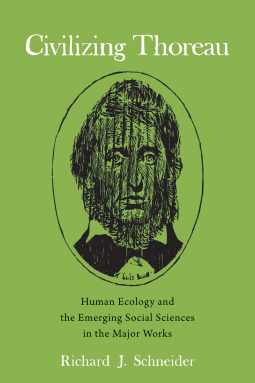
Civilizing Thoreau
Human Ecology and the Emerging Social Sciences in the Major Works
by Richard J. Schneider
This title was previously available on NetGalley and is now archived.
Buy on Amazon
Buy on BN.com
Buy on Bookshop.org
*This page contains affiliate links, so we may earn a small commission when you make a purchase through links on our site at no additional cost to you.
Send NetGalley books directly to your Kindle or Kindle app
1
To read on a Kindle or Kindle app, please add kindle@netgalley.com as an approved email address to receive files in your Amazon account. Click here for step-by-step instructions.
2
Also find your Kindle email address within your Amazon account, and enter it here.
Pub Date May 01 2016 | Archive Date Sep 29 2016
Boydell & Brewer | Camden House
Description
Proposes an interdisciplinary solution to the "Thoreau problem" through the connection between his ecological study of nature and his intense interest in the emerging social sciences.
Recent book-length studies of Thoreau have focused either on his place in the history of the natural sciences or have applied political principles to his works. None, however, has fully addressed what ecocritic Rebecca Solnit calls "the Thoreau problem," the compartmentalizing of Thoreau's mind into either that of a hermit of nature or that of a champion of social reform. This book proposes an interdisciplinary solution to this problem through the connection between Thoreau's ecological study of nature and his intense interest in the emerging social sciences, especially the history of civilization and ethnology.
The book first establishes Thoreau's "human ecology," the relation between the natural sciences and the social sciences in his thinking, exploring how his reading in contemporary books about the history of humanity and racial science shaped his thinking and connecting these emerging anthropological texts to his late nature writings. It then discusses these connections in his major works, including Walden and his "reform papers" such as "Civil Disobedience," the travel narrative A Week on the Concord and Merrimack Rivers, The Maine Woods, and Cape Cod. The concluding chapter focuses on Thoreau's attitude toward Manifest Destiny, arguing, against conventional views, that considering both his life and his writing, especially the essay "Walking," we must conclude that he both accepted and endorsed Manifest Destiny as an inevitable result of cultural succession.
Richard J. Schneider is Professor Emeritus from Wartburg College. He has authored a monograph and many articles as well as edited three collections on Thoreau.
Recent book-length studies of Thoreau have focused either on his place in the history of the natural sciences or have applied political principles to his works. None, however, has fully addressed what ecocritic Rebecca Solnit calls "the Thoreau problem," the compartmentalizing of Thoreau's mind into either that of a hermit of nature or that of a champion of social reform. This book proposes an interdisciplinary solution to this problem through the connection between Thoreau's ecological study of nature and his intense interest in the emerging social sciences, especially the history of civilization and ethnology.
The book first establishes Thoreau's "human ecology," the relation between the natural sciences and the social sciences in his thinking, exploring how his reading in contemporary books about the history of humanity and racial science shaped his thinking and connecting these emerging anthropological texts to his late nature writings. It then discusses these connections in his major works, including Walden and his "reform papers" such as "Civil Disobedience," the travel narrative A Week on the Concord and Merrimack Rivers, The Maine Woods, and Cape Cod. The concluding chapter focuses on Thoreau's attitude toward Manifest Destiny, arguing, against conventional views, that considering both his life and his writing, especially the essay "Walking," we must conclude that he both accepted and endorsed Manifest Destiny as an inevitable result of cultural succession.
Richard J. Schneider is Professor Emeritus from Wartburg College. He has authored a monograph and many articles as well as edited three collections on Thoreau.
Available Editions
| EDITION | Other Format |
| ISBN | 9781571139603 |
| PRICE | $120.00 (USD) |



